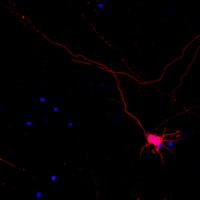Perinuclear biogenesis of mutant torsin-A inclusions in cultured cells infected with tetracycline-regulated herpes simplex virus type 1 amplicon vectors.
Bragg, D C, et al.
Neuroscience, 125: 651-61 (2004)
2004
Show Abstract
TorsinA is a novel protein identified in the search for mutations underlying the human neurologic movement disorder, early onset torsion dystonia. Relatively little is understood about the normal function of torsinA or the physiological effects of the codon deletion associated with most cases of disease. Overexpression of wild-type torsinA in cultured cells by DNA transfection results in a reticular distribution of immunoreactive protein that co-localizes with endoplasmic reticulum resident chaperones, while the dystonia-related mutant form accumulates within concentric membrane whorls and nuclear-associated membrane stacks. In this study we examined the biogenesis of mutant torsinA-positive membrane inclusions using tetracycline-regulated herpes simplex virus amplicon vectors. At low expression levels, mutant torsinA was localized predominantly around the nucleus, while at high levels it was also concentrated within cytosolic spheroid inclusions. In contrast, the distribution of wild-type torsinA did not vary, appearing diffuse and reticular at all expression levels. These observations are consistent with descriptions of inducible membrane synthesis in other systems in which cytosolic membrane whorls are derived from multilayered membrane stacks that first form around the nuclear envelope. These results also suggest that formation of mutant torsinA-positive inclusions occurs at high expression levels in culture, whereas the perinuclear accumulation of the mutant protein is present even at low expression levels that are more likely to resemble those of the endogenous protein. These nuclear-associated membrane structures enriched in mutant torsinA may therefore be of greater relevance to understanding how the dystonia-related mutation compromises cellular physiology. | 15099679
 |
TorsinB--perinuclear location and association with torsinA.
Hewett, Jeffrey W, et al.
J. Neurochem., 89: 1186-94 (2004)
2004
Show Abstract
The torsins comprise a four-member family of AAA+ chaperone proteins, including torsinA, torsinB, torp2A and torp3A in humans. Mutations in torsinA underlie early onset torsion dystonia, an autosomal dominant, neurologically based movement disorder. TorsinB is highly homologous to torsinA with its gene adjacent to that for torsinA on human chromosome 9q34. Antibodies have been generated which can distinguish torsinA and torsinB from each other, and from the torps in human and rodent cells. TorsinB (approximately MW 38 kDa), like torsinA ( approximately MW 37 kDa), is an N-glycosylated protein and both reside primarily in the endoplasmic reticulum (ER) and nuclear envelope in cultured cells. Immunoprecipitation studies in cultured cells and human brain tissue indicate that torsinA and torsinB are associated with each other in cells. Overexpression of both wild-type torsinB and mutant torsinA lead to enrichment of the protein in the nuclear envelope and formation of large cytoplasmic inclusions. We conclude that torsinB and torsinA are localized in overlapping cell compartments within the same protein complex, and thus may carry out related functions in vivo. | 15147511
 |
TorsinA in PC12 cells: localization in the endoplasmic reticulum and response to stress.
Hewett, Jeffrey, et al.
J. Neurosci. Res., 72: 158-68 (2003)
2003
Show Abstract
Most cases of early-onset torsion dystonia are caused by deletion of GAG in the coding region of the DYT1 gene encoding torsinA. This autosomal dominant neurologic disorder is characterized by abnormal movements, believed to originate from neuronal dysfunction in the basal ganglia of the human brain. The torsins (torsinA and torsinB) are members of the "ATPases associated with a variety of cellular activities" (AAA(+)) superfamily of proteins that mediate chaperone and other functions involved in conformational modeling of proteins, protection from stress, and targeting of proteins to cellular organelles. In this study, the intracellular localization and levels of endogenous torsin were evaluated in rat pheochromocytoma PC12 cells following differentiation and stress. TorsinA, apparent MW 37 kDa, cofractionates with markers for the microsomal/endoplasmic reticulum (ER) compartment and appears to reside primarily within the ER lumen based on protease resistance. TorsinA immunoreactivity colocalizes with the lumenal ER protein protein disulfide isomerase (PDI) and extends throughout neurites. Levels of torsinA did not increase notably in response to nerve growth factor-induced differentiation. None of the stress conditions tested, including heat shock and the unfolded protein response, affected torsinA, except for oxidative stress, which resulted in an increase in the apparent MW of torsinA and redistribution to protrusions from the cell surface. These findings are consistent with a relatively rapid covalent modification of torsinA in response to oxidative stress causing a change in state. Mutant torsinA may interfere with and/or compromise ER functions, especially in dopaminergic neurons, which have high levels of torsinA and are intrinsically vulnerable to oxidative stress. | 12671990
 |













